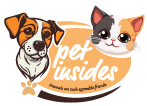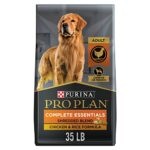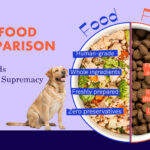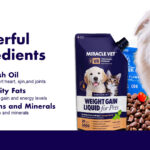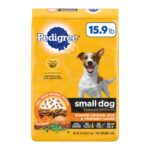The best dog foods for Goldendoodles blend high-quality proteins, healthy fats, and essential nutrients. Options like Royal Canin Breed Health Nutrition Golden Retriever Adult Dry Dog Food cater to their unique dietary needs.
Choosing the best dog food for your Goldendoodle involves considering their special health requirements and active lifestyle. Goldendoodles, a crossbreed of Golden Retrievers and Poodles, typically thrive on formulas that support their energetic nature and promote a healthy coat. Essential fatty acids like Omega-3 and Omega-6 are vital for their curly, hypoallergenic coats, while glucosamine and chondroitin support joint health as they age.
Probiotics are also important for maintaining digestive health. It’s crucial to select a dog food that meets the nutritional standards set by the Association of American Feed Control Officials (AAFCO). So, while the diet should be high in protein, it should also be balanced with the right type of grains or grain-free options to suit individual sensitivities and nutrient absorption for your furry friend.

Unveiling Goldendoodle Diet Essentials
Discovering the perfect dog food for your Goldendoodle can be as intricate as their curly lovable coats. Known for their charming disposition and intelligent traits, Goldendoodles require a diet that not only satisfies their taste buds but also nourishes their unique blend of energy and size. Dive into the essentials of a Goldendoodle diet that merges the need for wholesome nutrition with these dogs’ special dietary needs.
Importance Of Tailored Nutrition
Understanding the significance of tailored nutrition is the first step to ensuring your Goldendoodle thrives. Like any hybrid breed, Goldendoodles benefit immensely from a diet formulated to support their specific health requirements and growth patterns. A one-size-fits-all approach just won’t cut it. Comprehensive nourishment is fundamental, focusing on the right balance of proteins, carbs, fats, vitamins, and minerals to maintain their vivacious energy.
Unique Dietary Requirements
Goldendoodles carry a unique genetic tapestry that often correlates with distinctive dietary needs. Their food sensitivities and allergy predispositions necessitate a keen eye on ingredients. High-quality sources of protein such as fish, poultry, or lamb, paired with digestible carbohydrates like sweet potatoes and brown rice, can complement their digestive systems. To fortify their lush coats and healthy skin, incorporating foods rich in omega-3 and omega-6 fatty acids is beneficial.
- A proper balance of nutrients
- Consideration for food sensitivities
- Ingredients promoting a healthy coat
Brief On Goldendoodle’s Activity Levels
Goldendoodles exude a spirited blend of poodle intelligence and retriever enthusiasm, resulting in a notably active canine. Their dietary intake must parallel their lifestyle and activity levels. Regular, vigorous exercise is a staple for this breed, indicating a need for calories that sustain their zestful endeavours. An ideal diet will cater to these energetic demands while preventing the pitfalls of overfeeding, ensuring your Goldendoodle remains agile and healthy.
| Activity Level | Recommended Caloric Intake |
|---|---|
| Low | Approximately 1,000 kcal/day |
| Moderate | Approximately 1,400 kcal/day |
| High | Approximately 1,800 kcal/day |
Keep in mind that these figures are estimates, and the actual dietary needs may vary based on your Goldendoodle’s size, age, and health condition. Consulting with a veterinarian can help refine the daily caloric intake for optimal health.
Best Dog Foods For Goldendoodles: Tail-wagging Picks!
Gleaming coats, boundless energy, and an adorable teddy bear-like demeanor—your Goldendoodle deserves the best nutrition to maintain their unique charm. Choosing the perfect dog food can feel like navigating a labyrinth; to simplify your journey, we’ve rounded up our top picks specifically catered to the needs of your Goldendoodle. Each has been scrutinized for ingredients, nutrient balance, and pooch-pleasing flavour!
High-quality Protein Sources
Protein is the cornerstone of a robust diet for any dog, especially the active and playful Goldendoodle. Their lean muscles require a steady supply of amino acids that only high-grade proteins can provide. Look for foods featuring real meat, such as chicken, beef, fish, or lamb, as the first ingredient. It ensures the building blocks for a vibrant, healthy life are at the very heart of their diet.
- Chicken – lean and packed with essential nutrients.
- Beef – Rich in iron and vitamin B12 for vitality.
- Fish – A superb source of omega-3 for coat health.
- Lamb – Often used in hypoallergenic formulas.
Essential Fatty Acids
The coveted Goldendoodle coat is not just for show; it’s a reflection of inner health. Enter essential fatty acids, like omega-3 and omega-6, the unsung heroes for skin and coat vitality. These nutrients fight inflammation, support cognitive functions, and keep the skin barrier strong. Salmon, flaxseeds, and fish oil are stellar sources to look for in your Goldendoodle’s diet.
| Fatty Acid | Benefits | Common Sources |
|---|---|---|
| Omega-3 | Supports coat shine and reduces inflammation | Salmon, fish oil, and flaxseeds |
| Omega-6 | Encourages healthy skin and aids in cell repair | Poultry fat, plant oils |
Allergen Considerations
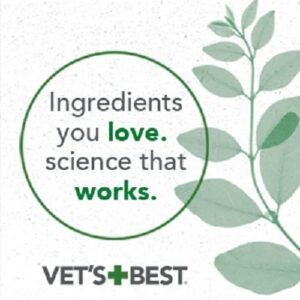
Goldendoodles may inherit a sensitive stomach from their poodle lineage, making allergen considerations a must when selecting food. Opt for formulas free from common allergens such as corn, wheat, soy, and artificial additives. Hypoallergenic or limited-ingredient diets can significantly reduce the risk of adverse reactions, keeping your dog’s digestive system as joyful as its disposition.
- Choose a limited-ingredient diet to minimise exposure to allergens.
- Opt for grain-free options if grains are a known irritant.
- Seek out natural preservatives like vitamin E (mixed tocopherols) instead of artificial ones.
- Consider a novel protein source if your dog has shown sensitivities in the past.
Analysing Nutritional Needs For Different Life Stages
Understanding the evolving nutritional needs of Goldendoodles throughout their life stages is crucial for their well-being. This breed is known for its playfulness, intelligence, and affectionate nature, and to maintain these qualities, a proper diet is essential. Whether a bouncy puppy, an energetic adult, or a graceful senior, each life stage comes with specific dietary requirements. Here, we will break down the nutrition essentials tailored to support your Goldendoodle’s health from puppyhood to its golden years.
Puppyhood Nutritional Foundations
Goldendoodle puppies grow rapidly, necessitating a diet rich in high-quality proteins and fats to support their muscle and bone development. Essential nutrients in their diet should include:
- DHA (Docosahexaenoic Acid) for cognitive and vision development
- Calcium for healthy bone and tooth growth
- Antioxidants for a robust immune system
Suitable puppy foods often come in the form of kibble specifically designed for large-breed puppies to promote a controlled and steady growth rate, preventing joint issues later in life.
Adult Maintenance And Health
As Goldendoodles reach adulthood, their nutrition should pivot to maintain their health and energy levels. An adult Goldendoodle’s diet should balance high-quality proteins, carbohydrates, fats, and fiber. Incorporate these key elements:

| Nutrient | Breed-Specific Benefit |
|---|---|
| Omega-3 Fatty Acids | For a shiny coat and healthy skin |
| Glucosamine | Joint health support |
| Probiotics | Digestive Health |
Proper calorie management is essential to avoid overfeeding, as Goldendoodles can be prone to obesity, which can lead to other health issues.
Senior Goldendoodles Dietary Adjustments
As Goldendoodles age, their metabolism slows down, and they may become less active. It’s vital to adjust their diet to their changing needs to mitigate weight gain and ease the strain on ageing joints. Focus on nutrient-dense foods that are low in calories but high in fibre. Look for ingredients that support joint health, like:
- Chondroitin
- Glucosamine
- EPA (eicosapentaenoic acid)
Additionally, senior-specific dog foods often contain L-carnitine, which is beneficial for maintaining a healthy weight and metabolism in less active dogs.
Ideal Macronutrient Ratios For Goldendoodles
For Goldendoodle owners, nothing is more vital than ensuring the health and happiness of their furry family members, and that starts with what goes into their food bowl. The key to a balanced diet for your Goldendoodle is understanding the ideal macronutrient ratios. Macronutrients, namely proteins, fats, and carbohydrates, should be in the correct balance to maintain your dog’s optimal health. This balance supports their energetic lifestyle, maintains a healthy weight, and contributes to their overall well-being.
Proteins
Proteins are the building blocks of muscle and are essential for repair and growth. For Goldendoodles, a diet with a high-quality protein source should be at the heart of their nutritional intake. The protein content should range from 22–32% for puppies and 18–25% for adult dogs, depending on their activity level and life stage. Animal-based proteins such as chicken, beef, and fish provide a complete amino acid profile that’s crucial for your dog’s health.
Fats
Fats are a dense source of energy that help keep your Goldendoodle’s coat shiny and support bodily functions. However, it’s crucial to find the balance, as too much fat can lead to obesity. Ideal dietary fat content typically ranges from 8–15%. Sources of good fats include chicken fat, fish oil, and flaxseed, which offer omega-3 and omega-6 fatty acids, aiding in brain development and reducing inflammation.
Carbohydrates
Carbohydrates, while not essential nutrients in a dog’s diet, should come from high-quality, digestible sources such as brown rice, vegetables, and whole grains. They provide a quick source of energy and fibre, contributing to a healthy digestive system. For a balanced diet, carbohydrates should usually not exceed 50% of the total diet. This helps prevent spikes in blood sugar and ensures sustained energy throughout the day.
Impact On Goldendoodle’s Energy And Weight
The macronutrient balance directly influences your Goldendoodle’s energy levels and weight. An optimal blend of proteins, fats, and carbohydrates ensures that your pet has the stamina for their daily activities without tipping the scales towards weight gain. Regular feeding with the right proportions tailored to your dog’s size, age, and activity level can help maintain lean muscle mass and prevent obesity—a common health issue in dogs. Monitoring their intake and adjusting their diet in consultation with a veterinarian can lead to a happier, healthier life for your Goldendoodle.
Spotting High-caliber Ingredients
Feeding your Goldendoodle the best possible diet is essential for their health and happiness. But with so many dog food brands on the market, identifying high-quality ingredients in your furry friend’s meals can be a challenge. To ensure that your Goldendoodle thrives, you’ll need to become savvy at spotting top-notch nutritional components in dog foods. Here are key areas to focus on:
Identifying Whole Food Components
The hallmark of premium dog food lies in its whole-food ingredients. A glance at the label should reveal identifiable items such as real meats (like chicken, beef, or fish), wholesome vegetables, and nutrient-rich grains or legumes. These components provide a balanced array of vitamins, minerals, and proteins that support every aspect of your Goldendoodle’s well-being.
- Meats: Look for specific names like ‘deboned turkey’ instead of generic terms like ‘poultry’.
- Vegetables: Carrots, peas, and sweet potatoes should be easily recognisable on the ingredient list.
- Grains/Legumes: Quinoa, brown rice, or lentils are excellent examples of beneficial grains and legumes.
Steering Clear Of Fillers And Additives
The presence of fillers, such as corn, wheat, gluten, or meat by-products, often indicates subpar food quality. These ingredients add bulk but have little nutritional value. Similarly, excessive additives like artificial colours, flavours, or preservatives are red flags. Your Goldendoodle’s health can be compromised by long-term consumption of such substances.
| Undesirable Fillers | Artificial Additives |
|---|---|
| Corn syrup | Artificial colourants (e.g., Red 40) |
| Meat by-products | BHA (Butylated Hydroxyanisole) |
| Wheat gluten | Propylene glycol |
Organic Vs. Non-organic Ingredients
The debate between organic and non-organic ingredients is ongoing, but the choice can greatly impact your dog’s diet. Organic dog foods are made with ingredients that are not only free from harmful pesticides and GMOs but also sustainably farmed, which can be beneficial to your Goldendoodle’s digestive and immune systems.
- Organic Proteins: These come from animals raised without antibiotics or hormones.
- Organic Plants: Grown without synthetic fertilizers or pesticides, healthier for your pet and the environment.
- Organic Grains: Farmed with natural methods ensuring no contamination with toxic substances.
Ensuring your Goldendoodle consumes high-quality dog food with superior ingredients translates directly into their overall well-being. It’s not just about a shiny coat or healthy weight; it’s about a vibrant, energetic companion who is getting the nourishment needed to live a long and joyful life.
Hypoallergenic Options For Sensitive Pups
Welcome to the doggy diet dilemma of finding the perfect meal for your Goldendoodle with a delicate stomach. With this breed’s popularity skyrocketing, it’s essential to address their unique dietary needs. Navigating the world of hypoallergenic dog foods can be a challenge, but worry not! This post is dedicated to helping your furry friend chow down without the itch or upset. Let’s explore tailored nutrition that keeps their tails wagging and their immune systems serene.
Understanding Food Sensitivities And Allergies
Before diving into the food bowl, understanding the difference between food sensitivities and allergies is crucial. Food sensitivities often manifest as gastrointestinal issues like diarrhea or constipation and sometimes lead to skin irritations. Allergies can cause more pronounced immune responses, potentially resulting in hives, swelling, or anaphylaxis. Goldendoodles may inherit these traits, so pinpointing triggers and opting for a hypoallergenic diet can lead to relief and a happier pup.
Best Hypoallergenic Dog Food Brands
As paw parents, finding a brand that caters to your Goldendoodle’s special needs is a priority. The market offers a variety of specialty foods, but here’s a short list of brands that rise above the rest:
- Ollie – Known for crafting custom meal plans with novel proteins and minimal ingredients.
- Canidae PURE – Offers grain-free options and limited ingredient diets, ideal for sensitive dogs.
- Blue Buffalo Basics Limited Ingredient: Focuses on simplified diets to minimize allergic reactions.
- P.S. For Dogs 100% Hypoallergenic: – Ultra-premium recipes that exclude common irritants.
Reading Labels For Common Allergens
To safeguard your Goldendoodle’s health, practice vigilant label-reading. Common allergens in dog food include corn, wheat, soy, dairy, and chicken. These ingredients often hide in long ingredient lists, so keeping a sharp eye is imperative. Seek out labels with clear, straightforward compositions and look for keywords like “limited ingredient,” “grain-free,” or “single protein source” to guide you to a safer selection.
| Allergen | Commonly Found In |
|---|---|
| Corn | Fillers, binders in kibble |
| Wheat | Carbohydrate sources, thickeners |
| Soy | Protein alternatives, texturizers |
| Dairy | Flavor enhancers, processed treats |
| Chicken | Main protein, meal byproducts |
Dry Food Versus Wet Food Debate
Choosing the right food for your Goldendoodle can feel like navigating a maze with endless options and opinions. One of the key divergences you’ll encounter in the world of canine nutrition is the dry food versus wet food debate. Understanding the differences can help tailor your Goldendoodle’s diet to suit their specific health requirements and taste preferences. Let’s delve into the benefits and drawbacks of each, and consider a combination approach for achieving an optimal diet.
Pros And Cons Of Kibble
Known for its convenience, kibble is a popular choice among many Goldendoodle owners. The crunchy texture helps clean teeth by reducing plaque and tartar build-up. It’s also cost-effective and boasts a long shelf life, eliminating the worry of quick spoilage.
On the flip side, some argue that kibble can contain less moisture, making it imperative for your Goldendoodle to drink ample water. Additionally, certain brands might use fillers and preservatives that offer little nutritional value. To make an informed choice, look closely at the ingredients list. High-quality kibble should list real meat as the first ingredient, followed by whole vegetables, fruits, and grains (if your pet isn’t grain-sensitive).
The Case For Canned Food
Canned food, often referred to as wet food, is another option. It has a higher moisture content compared to kibble, which can be beneficial for hydration, especially if your Goldendoodle isn’t keen on drinking water regularly. Packed with proteins and fats, wet food is typically more palatable and can be a good choice for pickier eaters.
However, the cost of canned food is generally higher, and once opened, it needs to be consumed within a few days thus lacking the convenience of kibble’s long-lasting storage. The moist nature may also contribute to dental problems if not paired with proper dental care routines.
Mixing Both Types For An Optimal Diet
To harness the benefits of both dry and wet food, consider mixing both types into your Goldendoodle’s diet. This hybrid approach ensures your pooch gets hydration from the wet food and the dental benefits of kibble. It also adds variety to meals, which can be more enjoyable for your dog.
- Vary the proportions depending on your dog’s preferences and nutritional needs.
- Keep an eye on the calorie intake to prevent overfeeding.
- Ensure each meal is balanced with the necessary vitamins and nutrients.
Feeding a combination requires careful consideration of the serving sizes to maintain a healthy weight; working with a vet or a pet nutritionist can help establish the right balance.
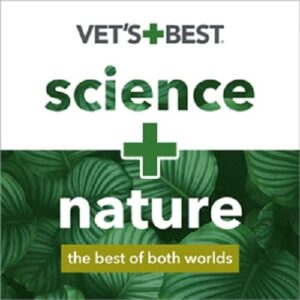
Home-cooked Meals And Raw Diets
Transitioning to home-cooked meals or a raw diet can provide your Goldendoodle with a variety of nutritional benefits, often unmatched by commercial dog foods. By opting for these diet plans, you have more control over the quality of ingredients and the ability to tailor the diet to your pet’s specific health needs. Let’s delve into the advantages of home-prepared foods and explore how to safely implement a balanced raw diet for your beloved Goldendoodle.
Benefits Of Home-prepared Foods
Personalizing your Goldendoodle’s diet with home-cooked meals can lead to an improved coat, better digestion, and overall vitality. Here are some compelling reasons to consider:
- No fillers or preservatives: Home-cooked meals are free from the artificial additives found in some commercial kibbles.
- Customizable for allergies: You can easily eliminate allergens and select hypoallergenic ingredients.
- Freshness and variety: Using fresh ingredients ensures a rotation of nutrients and tastes, which can be both healthier and more exciting for your pet.
Guidelines For A Balanced Raw Diet
Educating yourself on the basics of a raw diet for dogs is essential to ensuring it’s balanced and nutritious. Keep these points in mind:
| Component | Recommended Proportion |
|---|---|
| Raw Muscle Meat | 50-75% |
| Raw Bones | 10-20% |
| Organ Meats | 5-10% |
| Fruits and Vegetables | 5-20% |
| Supplements | As needed |
Ensure you consult with a veterinarian to create a diet that meets all of your Goldendoodle’s nutritional needs.
Safe Food Handling Practices
Protecting your pet from foodborne illnesses is just as important as providing a balanced diet. Adhere to these practices:
- Sanitation: Always wash your hands before and after handling raw food.
- Storage: Keep raw meat and bones at safe temperatures, refrigerated or frozen until use.
- Preparation: Use separate cutting boards and utensils for raw foods to prevent cross-contamination.
- Disposal: Safely dispose of any uneaten food and clean the feeding area regularly to avoid the spread of bacteria.
Sticking to these practices ensures your Goldendoodle enjoys the benefits of a raw or home-cooked diet without the risks.
Supplements For A Health Boost
Diet plays a pivotal role in the health and vigor of Goldendoodles. Even with the best dog foods, some Nutrients might require a bump for optimal wellness. Supplements can fill these nutritional gaps. They aid in preventing deficiencies and promote a flourishing life for these active, loving companions. The right additions to a Goldendoodle’s diet contribute to everything from a shiny coat to strong joints. Let’s examine the essential vitamins, minerals, and other supplements ideal for this hybrid breed.
Essential Vitamins And Minerals
Goldendoodles thrive on a balance of essential vitamins and minerals. These nutrients support various functions, from a robust immune system to proper metabolic processes. Tailored dog foods often include:
- Vitamin A for skin, coat, and eye health.
- B Vitamins for energy and overall metabolism.
- Vitamin C is an antioxidant and immune booster.
- Vitamin E for cell function and fat metabolism.
- Calcium for strong bones and teeth.
- Phosphorus complements calcium for bone health.
- Potassium for nerve and muscle function.
It’s essential to ensure a good balance of these nutrients. Over-supplementation can be just as detrimental as a deficiency. Therefore, consult your veterinarian before adding extra vitamins or minerals to your Goldendoodle’s diet.
Joint Supplements For Active Breeds
Goldendoodles, known for their playful and energetic nature, can benefit greatly from joint supplements. Key components such as glucose and chondroitin are popular for maintaining healthy cartilage and joint fluid. These supplements can:
- Improve mobility in dogs showing signs of joint stiffness.
- Reduce the inflammation that leads to pain.
- Offer preventive care for younger, active dogs.
For aging Goldendoodles or those with a history of joint issues, these supplements can work synergistically with a balanced diet to enhance joint health.
When To Consider Probiotics
Probiotics contribute to a healthy digestive system. They populate the gut with beneficial bacteria, aiding in digestion and fighting off pathogens. For Goldendoodles facing gastrointestinal issues, probiotics can be a game-changer. Consider probiotics:
- After a round of antibiotics, which can deplete beneficial gut flora.
- When digestive irregularities, such as diarrhea or constipation, occur.
- As a daily supplement for dogs with sensitive stomachs or to enhance overall gastrointestinal health.
Many high-quality dog foods now come fortified with probiotics, but consult your vet to determine if an additional supplement might be necessary for your Goldendoodle’s unique needs.
Special Dietary Considerations
When it comes to special dietary considerations for Goldendoodles, owners should understand that their fluffy companions have unique nutritional needs. Just like any beloved breed, Goldendoodles may face specific dietary challenges that can be curtailed or enhanced through a carefully selected diet. It’s not just about satisfying their appetites; it’s about providing them with a balance of nutrients that supports their overall health and lifestyle. From managing their weight to addressing health issues and ensuring proper hydration, each meal plays a pivotal role in maintaining their wellbeing.
Weight Management For Goldendoodles
Achieving and maintaining a healthy weight is crucial for a Goldendoodle’s overall health. Given their playful nature and energy levels, proper caloric intake is essential.
- Choose dog foods with a balanced protein-to-fat ratio that aligns with their activity level.
- Consider a diet with fiber-rich ingredients to help them feel full and regulate digestion.
- Monitor portion sizes and adjust as recommended by your veterinarian.
Dog foods geared towards weight management should be formulated with these factors in mind, ensuring your Goldendoodle stays fit and healthy.
Managing Common Health Issues Through Diet
Goldendoodles, like any hybrid breed, can inherit health issues common to their parentage: Poodles and Golden Retrievers. The selection of an appropriate diet can mitigate the risk or impact of these problems.
| Health Issue | Dietary Adjustment |
|---|---|
| Hip Dysplasia | Incorporate omega-3 fatty acids for joint health. |
| Allergies | Seek limited-ingredient or hypoallergenic formulas. |
| Ear Infections | Avoid ingredients that may exacerbate yeast growth. |
Working with a vet to identify and then tailor your Goldendoodle’s diet can significantly improve their quality of life.
The Role Of Hydration In Nutrition
Nutrition isn’t just about what your Goldendoodle eats—it’s also about what they drink. Hydration is a cornerstone of good health for any dog, especially one as active as a Goldendoodle.
- Ensure your dog always has access to fresh, clean water.
- Consider wet food options to increase hydration, especially for dogs that are less inclined to drink water.
- Be aware of your dog’s hydration needs after exercise and in hot weather, and provide additional water accordingly.
Remember that a well-hydrated dog will have a better chance of digesting and absorbing nutrients from their food, fueling their active lifestyle.
Decoding Dog Food Labels
Choosing the perfect dog food for your Goldendoodle can feel like navigating a labyrinth of catchy phrases and mysterious ingredient lists. But don’t let the jargon dissuade you! Understanding the specifics behind dog food labels is vital in selecting a nutritious and well-balanced diet for your furry friend. Let’s delve into the key elements printed on dog food packages and demystify the details for your Goldendoodle’s optimum health.
Understanding Nutritional Analysis
Nutritional analysis on dog food labels offers insights into the proportions of protein, fat, fiber, and moisture present in the meal. Goldendoodles need a balanced diet that provides energy, supports a healthy coat, and maintains overall well-being.
Here’s what to look for:
- Protein: At the core of every canine diet, it should be listed first and come from real animal sources.
- Fat: Essential for energy and taste, but the type and amount are crucial.
- Fiber: Aids in digestion; look for natural sources like vegetables.
- Moisture: Wet foods will have higher percentages; they are vital for hydration.
Pay close attention to the guaranteed analysis that breaks down these components, ensuring that your Goldendoodle’s dietary needs align with the nutritional content of the food.
Spotting Marketing Versus Actual Quality
Dog food companies often use persuasive language to appeal to pet owners. Phrases such as “premium” or “all-natural” might catch the eye, but these terms are not always indicative of actual quality. To truly understand the caliber of the dog food, one must look beyond the marketing tactics.
Here’s how to decipher the facade:
- Claims of “premium” could be merely a branding strategy with no regulatory backing.
- “Organic” or “natural” should have certifications to validate their authenticity.
- Named meat sources, such as “chicken” or “beef,” are preferable to ambiguous “meat by-products.”.
Scrutinize the label for genuine quality indicators, like certifications and specific ingredient names, to select the best food for your dog.
Ingredient List Breakdown
The ingredient list on a dog food package is your window into the recipe’s composition. These ingredients are listed in descending order by weight, which makes it crucial to dissect this list carefully for your Goldendoodle’s nutritional advantage.
Consider the following when analyzing the ingredient list:
- The first few ingredients are the most significant; they comprise the bulk of the food.
- Specific animal proteins should be at the forefront, not vague descriptions like “poultry meal.”
- Whole foods (e.g., whole grains, fruits, and vegetables) trump processed options.
- Avoid foods with excessive fillers, artificial colors, or preservatives.
Always aim for a concise, transparent ingredient list that prioritizes wholesome, nourishing inputs over cost-cutting substitutes.
Tailored Food Picks For Picky Eaters
Discovering the perfect chow for a Goldendoodle with a discerning palate can be as challenging as solving a complex puzzle. Goldendoodles, with their affable personalities and luscious locks, may sometimes be picky eaters, necessitating a more curated approach to their diet. ‘Tailored Food Picks for Picky Eaters’ is not just a quest for high-quality ingredients but also an exploration into the realms of palatable bliss for these fuzzy companions. By harnessing the power of enticing flavors, smart transitioning strategies, and a reservoir of patience, owners can guide their Goldendoodles to a satisfying and nutritious feeding routine.
Enticing Flavors And Textures
What tempts a Goldendoodle’s palate? A symphony of flavors and a mosaic of textures might just be the answer. Selecting food that is rich in taste yet suitable for their dietary needs can transform mealtime into a delightful experience.
- Rich Protein Sources – Offer cuts of real chicken, beef, or fish as main ingredients to spark interest.
- Vegetable Accents – Integrate sweet potatoes or carrots for a sweet twist that is also packed with nutrition.
- Crunchy vs. Soft – Some Goldendoodles prefer a crunch, while others lean towards tender morsels. Assessing your dog’s texture preference is key.
- Grain-Free Options – For those with grain sensitivities, grain-free recipes can be as delicious as they are beneficial.
Strategies For Transitioning Foods
Introducing a Goldendoodle to new foods necessitates a strategic and gradual approach. Here’s how to make the transition seamless and stress-free:
- Start by mixing a small portion of the new food with the old, gradually increasing the amount over a week or two.
- Observe your dog’s reaction closely. If there are signs of gastrointestinal discomfort, slow the transition.
- Consistent Meal Times: By keeping a regular feeding schedule, dogs can adapt to new food in the comfort of a routine.
Patience And Persistence With Finicky Dogs
Catering to a finicky eater requires a gentle blend of patience and unwavering commitment. Consistency is crucial when introducing new diets to picky Goldendoodles; it normalizes the new and unfamiliar. Additionally, celebrating small victories, such as a few nibbles of new kibble, can encourage a pickier pooch to keep exploring. Positive reinforcement and the judicious use of healthy treats can also aid in winning over their discerning tastes. Remember, each dog is unique; therefore, what works for one may not work for another. Stay observant, adapt to your dog’s preferences, and consult with a vet to ensure all nutritional needs are met.
Frequently Asked Questions About the Best Dog Foods For Goldendoodles
What Makes a Dog Food Great for Goldendoodles?
Goldendoodles thrive on a diet that’s rich in protein, has moderate fat, and includes complex carbohydrates for sustained energy.
How Often Should Goldendoodles Eat Daily?
Adult Goldendoodles typically require two meals per day, while puppies may need three to four smaller meals.
Can Goldendoodles eat grain-free dog food?
Yes, Goldendoodles can eat grain-free dog food, but it’s essential to ensure they still receive all the necessary nutrients.
Are there specific vitamins for goldendoodles’ health?
Yes, vitamins such as A, E, and C, along with glucosamine, are beneficial for Goldendoodles’ coat health and joint support.
What Ingredients Should Be Avoided in Goldendoodle Dog Foods?
Avoid artificial colors, flavors, preservatives, and excessive fillers, such as corn and soy, which offer little nutritional value.
Is wet or dry dog food better for Goldendoodles?
This depends on the dog’s preference and health needs, but dry food generally helps with maintaining dental health.
What Protein Sources Are Best for Goldendoodles?
High-quality proteins like chicken, turkey, fish, and lamb are excellent for Goldendoodles, supporting muscle growth and maintenance.
Conclusion
Choosing the right food for your Goldendoodle is pivotal for their health and happiness. With the options highlighted, you’re well-equipped to make an informed decision. Remember, each pup is unique; consult your vet for tailored advice. Happy feeding, and may your furry friend thrive!
